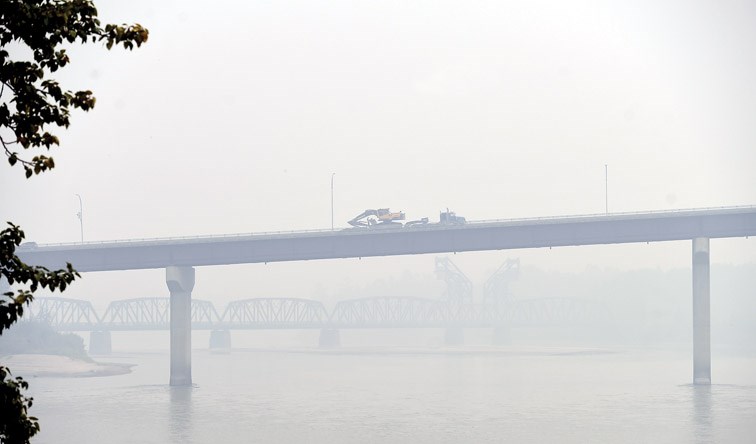Three B.C. cities were among the worst regions in the world for air pollution last summer thanks to thick smoke that choked the province during the wildfire season, according to an annual Greenpeace report.
Overall, B.C. and Canada aren't among the world's top air-polluters cited in the 2018 World Air Quality Report.
However, when broken down by month, B.C. made the top 10 list in August because of the smoke from the worst wildfire season on record. Smoke from fires in Washington state and Oregon also contributed to the poor air quality.
The report uses PM2.5 as a measure of air pollution. PM2.5 refers to particulate matter that measures up to 2 1/2 microns in size, and is regarded as the pollutant with the most adverse health impacts.
Quesnel and Prince George had air-quality readings in August that put them at Nos. 7 and 9 on the list for that month, with readings of 74.2 and 72.2, respectively. At No. 13, Williams Lake, with a reading of 67, also featured among the 20 worst in the world in August 2018.
All three of these areas had air-pollution levels deemed "unhealthy" by World Health Organization standards.
As a result, Prince George saw its average annual air-quality score worsen by nearly 70 per cent compared with 2017.
Notably, other areas hit hard by wildfire smoke last year, including Washington state and California, were also high on the list for August 2018.
"Climate-fuelled forest wildfires pushed air quality in B.C. communities to be some of the worst in the world last August. We cannot accept this," said Eduardo Sousa, forest campaigner at Greenpeace Canada. "Our province's vulnerability to forest wildfires has a major impact on the air we all breathe and has serious public-health implications. The report really underscores that we need to act on climate change more robustly for the sake of our well-being and our environment."
B.C. declared a state of emergency during both the 2017 and 2018 wildfire seasons. Last summer, a record 13,000 square kilometres of the province was consumed by fire.
Overall, 22 out of 30 of the world's worst cities for air pollution are in India, with Delhi ranked as the No. 1 capital city, according to the report. As for countries, the report ranks Canada well in terms of air pollution. It's No. 66 out of 73 countries, with Bangladesh No. 1, followed by Pakistan, India, Afghanistan and Bahrain.
The report, which uses air-quality data from public monitoring sources and IQAir AirVisual real-time data, notes that polluted air is the world's fourth-leading contributing cause of early death. The WHO estimates seven million people die a year from problems related to polluted air.



